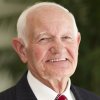The Great Commission has been called the great omission because it isn’t taken seriously by many who call themselves Christians. But it could also be called the “great omission” because of what is sometimes left out of Christ’s last command. Jesus not only told us to evangelize all nations, but He also said to disciple new believers. Teaching new believers the doctrines of the Word of God is as much the Great Commission as is the preaching of the Gospel. The word teaching found in the command and the word doctrine are very closely related. As soon as a person is saved, it’s our responsibility to nourish the believer with the great doctrines of God’s Word.
In the early days of my ministry, I led a Catholic man to the Lord. Afterwards I encouraged him to read the Bible and pray—I said it would help him grow.
“Father,” he called me because of his Catholic background, “I hope I don’t grow anymore.” He was a very large man, and he thought I was talking about physical growth! He may not have wanted to add a few inches (up or out), but he did want to grow spiritually. Just as newborn babies are anxious for milk, newborn believers are anxious to learn the teachings of the Bible.
Necessity Is the Mother of Instruction
Our family went to Japan in February of 1965. In February of 1966, we began our ministry in Senri Newtown, a suburb of Osaka Japan. The ministry was blessed by God in a miraculous way from the very beginning. Several were saved in our opening meetings and in the weeks to follow people were saved and baptized regularly—eighty-nine believers in the first year.
Because we were limited in our knowledge of the Japanese language, we had to enlist the help of the new believers. We didn’t really have a choice if we wanted to continue ministering. Our first year focused on teaching others how to do the work, not us doing it ourselves. Out of necessity, we followed what the Scriptures say in Ephesians 4:11–12, “And he gave some, apostles; and some, prophets; and some, evangelists; and some, pastors and teachers; For the perfecting of the saints, for the work of the ministry, for the edifying of the body of Christ.” In essence, our need forced us to obey the exhortation of the Bible.
Within the first year we had Sunday schools in five different locations in Senri Newtown. Mrs. Sisk would teach the new believers the lesson, then they would teach the children. It was amazing to see the spiritual growth in these new believers who were being taught and then given the responsibility of teaching others. Forty-four years later, many of those teachers are now serving as missionaries, pastor’s wives, and other ministry roles.
Rooted in Doctrine
During our first year in Japan there were six young men who answered the call to preach. Even before we started the Bible college, I began to teach them. As part of their training, they would preach regularly, either on Sunday night in our church or in meetings in other parts of the city.
I remember very well one of the first sermons of one of the young preachers. He stood up and announced to the congregation, “Tonight I want to preach on the Trinity.” I was shocked. I had taught about the Trinity, but in over ten years of ministry I had never preached a sermon on the Trinity. That night he preached a very good and profitable message on a very doctrinal subject.
That was forty-four years ago. Today that preacher, Sogoro Ogawa, is pastor of the Senri Newtown Baptist Church, the largest Baptist church in Japan. Four others of those young preachers are still faithfully preaching the Word of God today. New believers can be taught the great doctrines.
If you think that the early days of our ministry in Japan were strange, let me remind you of another church plant—Thessalonica. Paul did not stay in Thessalonica very long, but his letters to the church indicated they learned many important doctrines. He mentioned such things as grace, faith, election, the Trinity, sanctification, holiness, the resurrection, the rapture, the Second Coming of Christ, separation, peace, love, discernment, and pastoral authority.
The church at Thessalonica learned well. Paul said that they were a model church. “Ye were ensamples to all that believe in Macedonia and Achaia” (1 Thessalonians 1:7). It was a missionary church. “From you sounded out the word of the Lord not only in Macedonia and Achaia, but in every place” (v. 8). And it was a mature church. “Ye turned to God from idols to serve the living and true God and to wait for his Son from Heaven whom he raised from the dead even Jesus” (v. 10).
Doctrine and New Testament missions cannot be separated. In order to fulfill the Great Commission in our own churches and around the world, new believers must be taught the great truths of God’s Word.

